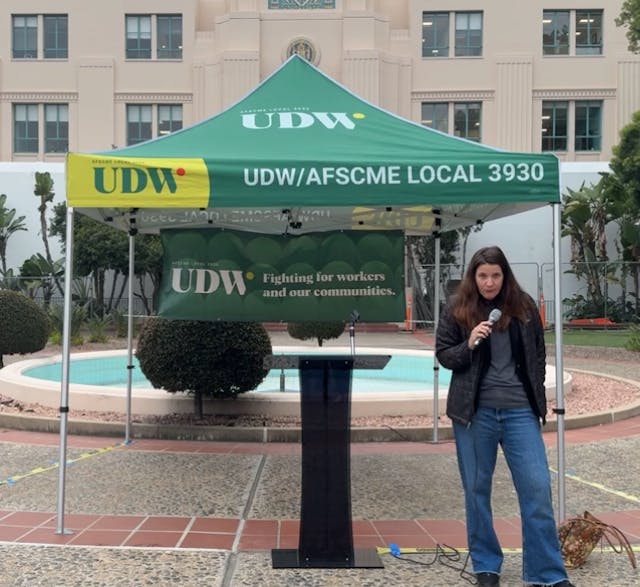Woodstock on the Border
Frontera NorteSur
A walk over the Santa Fe Bridge from El Paso to Ciudad Juarez reveals a whole new look to the Avenida Juarez main drag. In stark contrast to the recent years of decay, the Avenida’s buildings sport exteriors with fresh coats of white and beige paint. Wide sidewalks cushion the pedestrian’s feet, and the neatly lettered signs displayed above storefronts give an unusual uniformity to even the seedier bars that continue to operate.
But the real change comes several blocks below the bridge at the junction of Avenida Juarez and Avenida 16 de Septiembre. Once a busy traffic thoroughfare, this portion of Avenida 16 de Septiembre has been transformed into a big pedestrian mall, perhaps even meriting the name “The Grand Plaza of Juarez.”
After about one year in existence, the new plaza bustles with activity on weekends, as streams of Juarenses turn out to shop and dine, to take in a cultural event or simply to pass the day with the family. On a recent weekend, health workers administered vaccines, Jehovah’s Witnesses fished for souls, matachines danced and raised the Virgin of Guadalupe standard, chicas Movistar lured cellphone customers under a tent, and a singing clown entertained kids. Sellers of mangos, burritos, elotes, flan, and coconut water covered the plaza’s flanks.
As always, the cat-and-mouse game between unauthorized street vendors and government inspectors was not far away. Oscar “Pony Man” Vasquez was back in action, offering giggling children rides on his two ponies in return for pesos. Toting his infant son, Vasquez was pessimistic about his personal economic fortunes.
“The problems with inspectors never end,” he said. “I don’t see any solution here.” But Luis Estrada was more upbeat. A roaming belt seller, Estrada said sales had increased a bit since January, the notorious Mexican month of bill-paying for everything from government taxes to the family vacation over the Christmas holidays.
Perhaps best of all, Estrada noted that he had sold four belts on this day to “Ameri-canos,” the writer included. “Barely this year (US tourists) started coming,” the street vendor said. Although Estrada said inspectors had confiscated two belts from him earlier in the day, he was quick to add that making a living selling the products “was worth the risk.”
Above all, downtown Juarez on weekends resembles a musical carnival. At the intersection of Avenida Juarez and 16th de Septiembre, an indigenous Raramuri man dressed in traditional garb played a sweet violin.
Stationed up the plaza near the cathedral, German Martinez and fellow members of Tamborazo Zacatecano pounded out a brassy, percussion-driven sound, the musical genre that is the massive soundtrack every year to Aguascalientes’ San Marcos Fair, Mexico’s largest spring fair.
Band spokeswoman Estefania Romo defined the tam-bora sound as a sort of “country music” that is popular in Veracruz, Tamaulipas, Zacatecas and other states. In addition to playing for tips in the downtown plaza, Tamborazo Zacetacano does parties and other events, she said.
Not far from the frenzied beats and foot-stomping bursts of trumpet, another band let loose with an entirely different sound. Attracting an enthusiastic and largely older crowd, Juarez’s La Franja Fronteriza, or The Borderline, ground out their covers of “Let it Be” and “Proud Mary.” Inside a large human circle surrounding the musicians, older women and couples with big smiles and joyful eyes flashing from their faces danced on the street to the anthems of their youth.
Ranging in age from their 40s to 70s, the members of La Franja Fronteriza are seasoned veterans of Juarez’s rock music scene. Formed about five years ago, La Franja Fronteriza is composed of drummer and singer Paco Martinez; Ricardo “Kalin” Lujan Gonzalez, guitar and keyboards; Victor Hugo Arecco, drums and percussion; Fernando Flores, lead guitar; and Demetrio Garcia, bass guitar.
“It’s our intention to preserve the musical genre that moved Juarez before,” Martinez told FNS. Like the other street musicians, La Franja Fronteriza relies on tips to keep the music flowing. Martinez said the tip money beats the long hours and low pay many musicians put in at the city’s many bars.
“It’s better here,” the rock-n-roller insisted. “We don’t want to turn ourselves into slaves. Many colleagues are working like that because they have no other alternative.”
Paco’s brother, Mauro Martinez, contended that the downtown revitalization and the opening up of the big plaza has served both the musicians and public well. “It’s better than before. People walk easier and more peacefully,” Mauro said.
Featuring English-language lyrics, La Franja Fronteriza has something of a following on the other side of the border. Paco Martinez said the group had been invited to perform in El Paso, Los Angeles, Chicago and other U.S. cities, but could not comply for one simple reason. “We don’t have visas,” the singer sighed. Meantime, Martinez implored his northern neighbors to come and see the group on its home turf.
“Don’t be afraid to visit the neighbor city of Juarez,” Martinez urged. “We love you, USA!”
If anything, the accent on downtown Juarez’s outdoor musical scene is on rock. Every Saturday and Sunday, from late morning to early evening, visitors can catch many electrified bands in a large zone extending from the big plaza to the outdoor Velarde Street commercial corridor off Avenida Vicente Guerrero. On Sunday afternoons, the scene is even bigger with additional bands performing at the Bazar del Monu held astride the Benito Juarez Monument farther down on Vicente Guerrero.
At the Velarde Street corridor’s entrance, the three members of Los Lagartos, or The Alligators, took a pause in their afternoon repertoire of “Roll-over Beethoven” and other songs heartily delivered in the rockabilly style. An aspiring songwriter, Alberto Griego, tagged along with the crew.
A singer with an Elvis-like inflection who plucks a mean cello bass, 23-year-old Dorian Rodriguez took a moment to speak with FNS about the group’s music and recording plans.
Rodriguez rattled off several reasons why he likes rockabilly: “The rhythm, the style of the time, the dance, how it was danced, the style of dress.”
Besides Dorian, the trio includes his 22-year-old brother Edwin Rodriguez on guitar and Juan “The Ghost” Silva on drums. A young man with a stubble beard and a healthy head of hair, Edwin was dres-sed in a psychedelic colored t-shirt emblazoned with the name “Woodstock” on the front. The t-shirt was a gift, he said.
Many musicians are flocking to the downtown street scene, putting a cramp on tips, Dorian said. “We started out good but it’s slowed down,” the bassist said about the weekend take. “There is a lot of competition. There are a lot of bands in the downtown.”
By late afternoon, another band kicked out the jams near the spot where La Franja Fronteriza earlier played. Distinct from the softer rock of La Franja Fronteriza or the rock-abilly of Los Lagartos, the three players of Roller Papers create a heavier sound in their renditions of classics like “Crimson and Clover” and “Radar Love.”
Guitarist and singer Esteban Martinez mentioned The Doors, Pink Floyd, Led Zeppelin and Jimi Hendrix as other favorites of the band. Attired in checkered shirts with long hair tumbling over the their shoulders, Martinez and the bassist look like countercultural twins, while the drummer sports a Jimi Hendrix Afro in the making.
But make no mistake about it. Roller Papers is a young band, and Martinez a cross-border baby. Only 24 years of age, he grew up seeped in rock n’ roll as he learned English on a seven-year journey into the deep reaches of Migrant America-El Paso, Kansas City, Denver City in Texas and the little town of Cuba, New Mexico.
“It’s a border and we share two cultures,” Martinez commented on the popularity of rock in Juarez. The young rocker and his band mates are part of a musical community that now transcends multiple generations. If the veteranos like La Franja Fronteriza are the grandfathers and fathers, groups such as Roller Papers and Los Lagartos are the children and grandchildren following in their rock elders’ boogie steps.
“We’re friends, we all know each other,” Martinez said. Roller Papers’ front man even credited an earlier collaboration with Edwin Rodriguez for helping spur the current outdoor scene with performances at the Velarde Street corridor several years ago.
But like La Franja Fronteriza, Roller Papers probably won’t be playing at a U.S. venue anytime soon. That’s because of a problem related to a word in the group’s name. “We don’t have papers, passports,” Martinez said. Instead, the musician extended an inviting hand to music lovers in El Norte. “Every weekend, the downtown of Juarez is a party,” Martinez added. “It’s very beautiful here in Juarez. You have to get to know it, not only the bad.”
Shifting philosophical gears into overdrive, Martinez laid out his group’s heady mission. “Our purpose is to make sure rock n’ roll doesn’t die,” the border rockero vowed.






